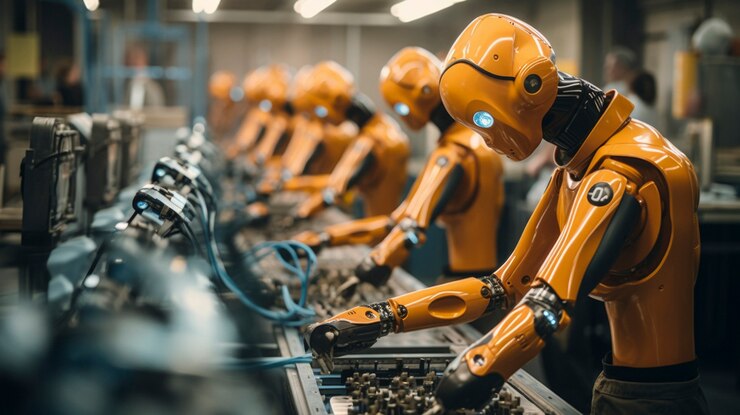Transforming Manufacturing Through AI: Unlocking Innovation and Resilience
The manufacturing industry has faced significant challenges over the past few years, including supply chain disruptions, workforce shortages, and increasing customer expectations. However, it remains one of the most resilient and complex sectors, entering a transformative era fueled by artificial intelligence (AI) and data-driven solutions. This article explores how AI is reshaping manufacturing, highlighting benefits, real-world examples, and the critical role of modern platforms like Dynamics 365 and Azure IoT Operations.
The Shift to AI in Manufacturing

As manufacturers grapple with industry-wide challenges, AI has emerged as a catalyst for innovation, efficiency, and sustainability. This shift is prompting organizations to fundamentally alter their business models and rethink how they address operational issues, such as data siloes, supply chain visibility, and labor shortages.
Key Trends Influencing AI Adoption
Increased Data Generation:
Manufacturing is one of the most data-intensive industries, generating an average of 1.9 petabytes of data annually. Despite this wealth of data, much remains untapped, limiting organizations’ ability to derive actionable insights.
Changing Consumer Demands:
Customers today expect high-quality products delivered swiftly. Manufacturers must adapt to these changing demands by streamlining operations and enhancing production capabilities.
Workforce Challenges:
The industry faces significant labor shortages, making it imperative to upskill existing employees and leverage technology to augment their capabilities.
1. Enhanced Operational Efficiency
AI-driven solutions can optimize manufacturing processes by analyzing data in real time. For instance, the integration of AI with operational technology (OT) and information technology (IT) can lead to more efficient production lines. By employing adaptive cloud approaches, such as Azure IoT Operations, manufacturers can create a common data foundation that enables seamless collaboration between IT and OT teams.
2. Improved Decision-Making
AI empowers front-line workers with tools to make informed decisions quickly. The introduction of Copilot templates for factory operations allows employees to interact with data using natural language, facilitating knowledge discovery and issue resolution. For example, if a factory manager needs insights on a malfunctioning machine, they can query the AI to identify the problem and implement solutions within days, significantly reducing downtime.
3. Data-Driven Insights
The AI-driven transformation of manufacturing enables organizations to glean insights from previously inaccessible data. Generative AI, for instance, offers recommendations based on data patterns, helping manufacturers optimize operations and enhance product quality. This capability is critical in addressing issues such as yield loss and production inefficiencies.
Intertape Polymer Group (IPG)
Intertape Polymer Group (IPG) illustrates the successful application of AI in manufacturing. By utilizing Sight Machine’s Manufacturing Data Platform, IPG continuously transforms data from factory equipment into a robust data foundation. This platform allows them to analyze and model machines, production processes, and finished products.
With the integration of the Factory CoPilot, powered by the Microsoft Cloud for Manufacturing, IPG has streamlined operations across its production lines. Teams can now access critical information quickly, improving collaboration among production, engineering, and finance departments. The result? Enhanced decision-making, improved yield, and reduced inventory levels.
The Role of Dynamics 365 in AI Integration

Microsoft’s Dynamics 365 suite plays a crucial role in enabling manufacturers to harness AI and data-driven insights. Dynamics 365 Field Service, for example, offers features that enhance communication among field service managers and technicians. By utilizing AI capabilities within Dynamics 365, organizations can effectively manage work orders and improve customer satisfaction.
Bridgestone’s Partnership with Avanade
Bridgestone partnered with Avanade to address production challenges by implementing a natural language query system within Dynamics 365 Supply Chain Management. This initiative focused on resolving production disruptions and scheduling inefficiencies, ultimately leading to faster issue resolution and enhanced operational agility.
By adopting these AI-driven tools, Bridgestone aims to create a centralized system that presents critical information from various sources. The result is a more resilient supply chain capable of adapting to rapid changes in production needs.
Overcoming Supply Chain Challenges
The complexity of supply chains has intensified, prompting nearly 90% of supply chain professionals to invest in strategies to enhance resilience. AI tools can significantly aid in this endeavor by providing visibility into product genealogy and tracking events throughout the supply chain.
Benefits of Traceability
The upcoming preview of a traceability add-in for Dynamics 365 Supply Chain Management exemplifies how AI can improve supply chain visibility. By enabling businesses to track products at various stages, this tool ensures that organizations can respond quickly to disruptions and maintain product quality.
Empowering the Workforce with AI Tools
An empowered and connected workforce is essential for intelligent factory operations. According to the latest Work Trend Index, 63% of front-line workers perform repetitive tasks that detract from more meaningful work. However, with the right AI tools, manufacturers can enhance employee experience and job satisfaction.
AI as a Workforce Augmentor
AI is not merely an automation tool; it serves as an augmentor of human capabilities. For example, front-line workers equipped with AI solutions can quickly find the information they need to resolve issues, allowing them to focus on higher-value tasks. This shift enhances productivity and fosters a more engaged workforce.
Realizing the Full Potential of AI Solutions

The Microsoft Cloud for Manufacturing empowers organizations to accelerate their AI journey by providing industry-relevant data solutions and application templates. By leveraging this cloud infrastructure, manufacturers can unlock the true potential of AI, leading to transformative outcomes.
Case Study: Electrolux Group
Electrolux Group has developed a unified platform to capture and contextualize manufacturing data for real-time decision-making. By leveraging Microsoft’s adaptive cloud approach, Electrolux aims to reduce overhead costs and streamline operations across multiple sites.
The integration of Azure IoT Operations into their platform allows Electrolux to manage key manufacturing use cases effectively. This cohesive strategy enables them to deploy and scale solutions efficiently, addressing the complexities of modern manufacturing.
The Future of Manufacturing with AI
The future of manufacturing is poised for significant transformation as organizations increasingly embrace AI-driven solutions. By integrating data analytics, automation, and advanced AI capabilities, manufacturers can optimize operations, enhance product quality, and improve customer satisfaction.
Trends to Watch
- Increased Investment in AI: As manufacturers recognize the value of AI, investments in AI technologies will continue to grow, leading to more innovative solutions.
- Focus on Sustainability: AI will play a pivotal role in driving sustainability initiatives within manufacturing, enabling organizations to reduce waste and optimize resource usage.
- Greater Collaboration Across the Ecosystem: The future will see increased collaboration between manufacturers, technology providers, and industry partners to accelerate digital transformation.
Conclusion
The manufacturing industry stands at the brink of a revolutionary transformation powered by AI and data-driven insights. By embracing AI solutions like Dynamics 365 and Azure IoT Operations, manufacturers can enhance operational efficiency, improve decision-making, and empower their workforce.
Through case studies like those of Intertape Polymer Group, Bridgestone, and Electrolux Group, it’s clear that the integration of AI is not just a trend but a necessity for survival in today’s competitive landscape. As we move forward, manufacturers who prioritize innovation and adaptability will lead the charge in shaping a resilient and sustainable future.










